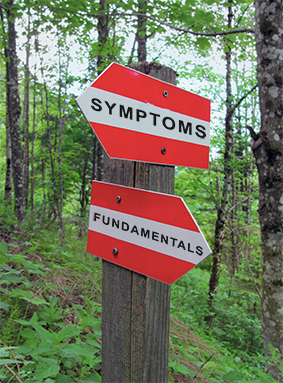Warren Kinston
16. September 2012 11:00
You will read again and again in popular scientific articles that we human beings are not very good at handling probability. It has become almost an article of faith.

John Kay, respected economist and academic, writes in the Financial Times (as noted here): “We do not often, or easily, think in terms of probabilities, because there are not many situations in which this style of thinking is useful."
Really? Is that true? More...
About
Warren Kinston
Warren Kinston
9. September 2012 10:00
Faced with a problem, should we focus on symptoms or on the fundamentals that generate those symptoms?

What does your common sense tell you? In practice, we know that it is often a difficult choice.
THEE was developed with the belief that a scientific identification of fundamentals in personal life was possible. It differed from the usual social science approach in making the focus of observation (and validation) people in the midst of committed action. A person who is committed is an entirely different being from a subject in a psychology experiment or a random respondent in a social survey. More...
About
Warren Kinston
Warren Kinston
11. March 2012 22:00
 Change is hard.
Change is hard.
Have I mentioned that before?
Not just hard to do, but hard to see and hard to grasp. I came across the superb blog of Giorgio Bertini; who covers an amazing amount of topics, all related to helping change agents. Just look at his category cloud. I doubt that it is just me who finds change massive and near-overwhelming.
So I'm progressing very slowly. Here is an update on latest thoughts. If you are new to THEE: see the graphic showing levels of WILL that also forms the framework for Personal Endeavour.
Is CHANGE the right name for Level 3 in the Root Hierarchy? It seems to work but that does not mean it is correct. When I was finalizing the Levels of Will, there were two levels causing me trouble. Level-5 was then called "Naming". It was probably because I was preoccupied with More...
About
Warren Kinston
Warren Kinston
24. February 2012 09:00
 Here is something maddening. A puzzle solved has created a puzzle.
Here is something maddening. A puzzle solved has created a puzzle.
I have worked out why there are so many structures with 7 levels in the Taxonomy. That was a relief because it was the commonest criticism. I would be accused of a love affair with 7, or just laughed at.
However, the reason is simpler and more fascinating than love. Nor does it deserve ridicule. It occurs because More...
About
Warren Kinston
Warren Kinston
19. February 2012 16:00

Life is not about what you believe, it is about what you do. And doing thrives on optimism, with some hope as the sauce. It chokes on pessimism marinated in cynicism and doubt.
These thoughts come from the latest posting on creativity. The topic is still in the forefront of my mind because I am working on the two postings for March. These are about what More...
About
Warren Kinston